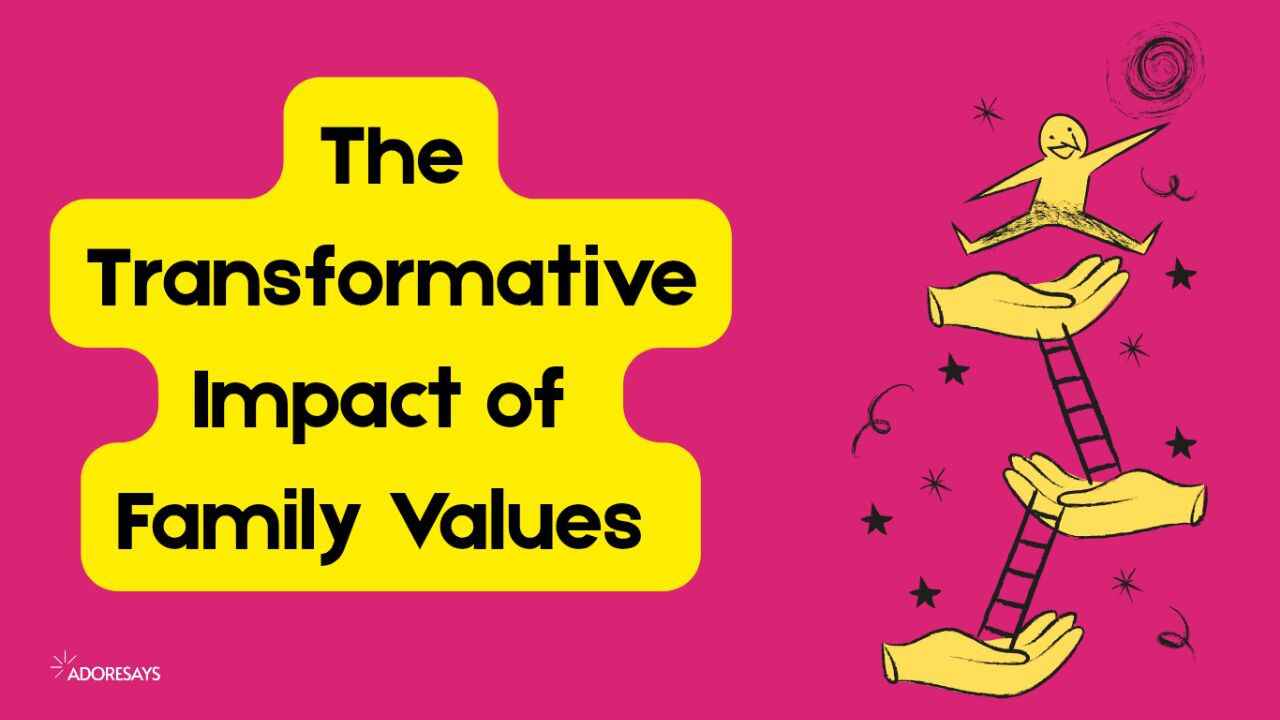In conversations about societal growth and the factors that sustain progress, one vital concept is often overlooked, family values. Think of it like this: imagine a tree without roots. It may seem to stand for a while, but it cannot survive. In this analogy, the tree represents society, and the roots represent the family. Without strong roots, the tree withers. Likewise, without strong families, society falters. That is why family is not just a social unit, it is the very foundation of societal existence. Family is the root; society is the fruit.
What Are Family Values?
When we speak of family values, we are referring to the core ethical and moral principles passed down within a family unit. These include honesty, kindness, respect, empathy, responsibility, hard work, courage, integrity, and a sense of duty, among others. These values shape an individual’s character from early childhood, serving as a compass that guides decisions and behavior well into adulthood.
These values are not only intrinsic to personal growth but are essential to building a thriving society. The cumulative effect of value-driven individuals creates socially responsible communities, making family values a critical force for national development.
How family values can affect societies?
One of the most significant contributions of the family is socialization; the process through which individuals learn societal norms, values, roles, and acceptable behavior. This early education forms the bedrock of a responsible citizenry. When families instill these principles in children, they lay the groundwork for future leaders, professionals, innovators, and changemakers.
A society built on such a foundation is bound to flourish. Conversely, when family structures break down, we witness a rise in deviance, lawlessness, and social instability.
Role Allocation and Responsibility.
Another powerful impact of family values lies in preparing individuals for societal roles. From an early age, families introduce children to the concept of responsibility, be it through chores, caring for siblings, or understanding boundaries. This seemingly simple training equips individuals to function effectively in organized society.
Whether it’s civic responsibility, professional accountability, or leadership, people raised with clear role expectations are more likely to thrive and contribute meaningfully in various spheres of life.
Security and Social Order.
Families also serve as a protective structure, shielding members from harmful influences while teaching them to respect laws and boundaries. This sense of
protection doesn’t only offer safety, it fosters discipline, resilience, and emotional intelligence.
The societal benefits are enormous: fewer cases of crime, greater adherence to norms, and increased respect for fellow citizens. Where families maintain order within, society enjoys peace without.
Cultural Identity and Emotional Strong.
A strong family background offers more than just material support, it gives a sense of identity and belonging. Passing on cultural heritage, values, and traditions fosters self-worth and confidence in individuals. This emotional stability becomes a psychological asset, empowering individuals to make balanced decisions and build positive relationships.
As emotional intelligence and cultural awareness grow, so too does the collective strength of a nation.
How can family values influence one’s health?
Good health is a pillar of sustainable development, and families are the first line of defense in maintaining both physical and mental wellness. Through nurturing
environments, emotional support, and encouraging healthy lifestyles, families ensure that individuals are fit, physically, emotionally, and mentally to contribute meaningfully to society.

A healthy population is a productive population. Thus, promoting health-conscious living within families creates ripple effects that touch all sectors of society, from education and workforce participation to innovation and longevity.
Prominent family values examples.
Economic Empowerment.
Another often underestimated impact of family is its role in economic empowerment. Families provide for the basic needs of their members; food, shelter, clothing, and education. But beyond immediate support, families also play a vital role in preparing individuals to become financially independent.
Teaching financial discipline, encouraging skill acquisition, and modeling a strong work ethic are all ways in which families contribute to long-term economic development. When youths are self reliant, the risk of engaging in criminal or unproductive activities drastically reduces. Hence, families that foster economic competence ultimately fuel national productivity and reduce the burden on state resources.
Is family values important?
While the benefits of family values are immense, their impact hinges on deliberate action. Family heads must be supported and educated on the importance of their roles as primary value instillers. This includes:
1.) Modeling positive behavior.
2.) Encouraging open dialogue about ethics and decision-making.
3.) Admitting and correcting mistakes transparently.
4.) Empowering children to make informed choices.
5.) Creating shared experiences that reinforce family bonds.
These actions don’t just strengthen families, they lay the groundwork for safer, healthier, and more prosperous communities.
Conclusion: A Call to Action.
Family values are not just traditional ideals, they are strategic tools for sustainable development. Every healthy society is built on the backbone of strong family units. As such, we must commit to nurturing these values in our homes, celebrating them in our communities, and reinforcing them through education and policy.
To build a better world, we must start at the root. Strengthen the family. Empower the society. Transform the future.
Author’s bio
Sylvester Chikelue Nnoli is a prolific writer, storyteller, and passionate advocate for
marginalized voices. With over a decade of experience in ghostwriting, editing, and
content/copywriting, he has helped countless clients bring their ideas to life. As a
valued contributor to Onikowe.com and Bedtime.com, his expertise in digital content
creation enhances businesses’ online presence and search engine rankings.
Born in Jos, Plateau State, Nigeria, Nnoli’s academic background in the study of religion
enriches his literary pursuits, allowing him to tackle diverse and thought-provoking
topics with depth. His works have been featured on Mooncafe.com, People’s Poetry,
Noise Medium, and Nircle.com, among others.
In 2011, he published Immoral Courage, a compelling book that critically examines
social vices affecting today’s youth. His storytelling prowess has earned him notable
accolades, including the January 2016 Storried.com short story contest and the
January 2024 African Unveiled contest by Nircle.com.
A dedicated member of the Association of Nigerian Authors since 2014 and an active
voice in the Mind Portal Penstar Club, Nnoli remains committed to using literature as a
tool for change. Whether through thought-provoking essays, compelling narratives, or
SEO-driven content, he bridges the gap between powerful storytelling and digital
visibility.






Leave a Reply